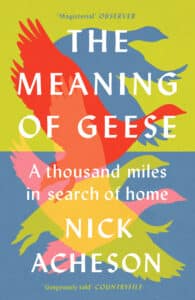
Through November and December, we’re casting a weekly spotlight on some of the best books based or published in the East of England, courtesy of the East Anglian Book Awards 2023.
Now in their sixteenth year, the awards celebrate the very best of publishing, writing, and reading in the region. The East Anglian Book Awards are a partnership between Jarrolds, the Eastern Daily Press, and the National Centre for Writing, supported by UEA Faculty of Arts & Humanities.
![]()

![]()
![]()
General Non-Fiction
Judged by Susan Burton, historian and writer
For fans of books on Norfolk landscape and nature…
 The Meaning of Geese by Nick Acheson (Chelsea Green Publishing)
The Meaning of Geese by Nick Acheson (Chelsea Green Publishing)
During a time when many of us faced the prospect of little work or human contact, renowned naturalist Nick Acheson found a sense of peace and purpose in his pursuit of the wild geese that filled the Norfolk skies on their seasonal visits from Iceland and Siberia. In The Meaning of Geese Nick recounts these adventures, starting with the dramatic arrival of the pinkfeet and brent geese as they land in the thousands in Britain each autumn.
Over seven months he cycles 1,200 miles – the exact length of the pinkfeet’s migration to Iceland, while encountering rarer geese, including Russian white-fronts, barnacle geese and an extremely unusual grey-bellied brant, a bird he had dreamt of seeing since thumbing his mother’s copy of Peter Scott’s field guide as a child. Nick keeps a diary of his sightings as well as the stories he discovers through the community of people, past and present, who love the geese and are working to protect their future.
For fans of unique books on plants…
 The History of the World in 100 Plants by Simon Barnes (Simon & Schuster)
The History of the World in 100 Plants by Simon Barnes (Simon & Schuster)
As humans, we hold the planet in the palms of ours hands. But we still consume the energy of the sun in the form of food. The sun is available for consumption because of plants. Plants make food from the sun by the process of photosynthesis; nothing else in the world can do this. We eat plants, or we do so at second hand, by eating the eaters of plants.
Plants give us food. Plants take in carbon dioxide and push out oxygen: they give us the air we breathe, direct the rain that falls and moderate the climate. Plants also give us shelter, beauty, comfort, meaning, buildings, boats, containers, musical instruments, medicines and religious symbols. We use flowers for love, we use flowers for death. The fossils of plants power our industries and our transport. Across history we have used plants to store knowledge, to kill, to fuel wars, to change our state of consciousness, to indicate our status. The first gun was a plant, we got fire from plants, we have enslaved people for the sake of plants.
We humans like to see ourselves as a species that has risen above the animal kingdom, doing what we will with the world. But we couldn’t live for a day without plants. Our past is all about plants, our present is all tied up with plants; and without plants there is no future.
Our judge said:
‘Each short chapter details the development and survival of humankind through its utilisation of the nutritional and medicinal qualities of plants from wheat and rice to tobacco and the opium poppy. The chapters are short, educational and beautifully illustrated, offering historical, literary and scientific information which makes the book a handy and entertaining reference.’
For anyone interested in Essex history…
 The Invention of Essex: The Making of an English County by Tim Burrows (Profile Books)
The Invention of Essex: The Making of an English County by Tim Burrows (Profile Books)
Essex. A county both famous and infamous: the stuff of tabloid headlines and reality television, consumer culture and right-wing politicians. England’s dark id.
But beyond the sensationalist headlines lies a strange and secret place with a rich history: of smugglers and private islands, artists and radicals, myths and legends. It’s where the Peasants’ Revolt began and the Empire Windrush docked. And – from political movements like Brexit to cultural events like TOWIE – where Essex leads, the rest of us often follow.
Deeply researched and thoroughly engaging, The Invention of Essex shows that there is more to this fabled English county than meets the eye.
Our judge said:
‘This is a very well researched tour of Essex viewed through the eyes of a journalist who has moved back there from London. It is extremely informative with each chapter offering a wealth of historical, ecological and sociological data about a county that one of his interviewees describes as a ‘second rate place, so we really didn’t care about it.’ I didn’t either until I read this book.’
You may also like...
Explore three incredible fiction books based in East Anglia

17th November 2023
East Anglian Book Awards 2023 shortlist announced
Celebrating the very best of publishing, writing, and reading in the region

7th November 2023
NCW staff recommend their favourite reads for autumn
From heart warming romance reads to page-turning horrors…

27th October 2023






